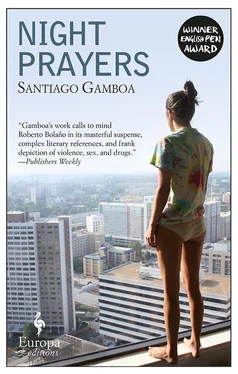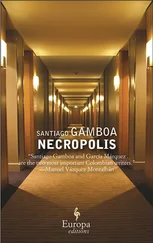She was wearing a blue jacket gathered in at the waist and covering her hips, as is traditional, and a veil, which was also blue, but a little lighter. She clearly respected the hijab, which is obligatory in Iran. Her eyes were beautiful. They stood out. The day before, I had dismissed the chauffeur I had been given by the government, so I called a taxi. Toward noon we set off for the airport, and when we got there we checked in without incident. The only anxious moment was when we went through Immigration, but since she was with me and I had a diplomatic passport, nobody asked any questions. When we got on the Mahan Air plane, she clasped her son to her chest and wept in silence.
The flight lasted four and a half hours, but I preferred not to ask her any questions and she barely spoke during the journey. I only heard her making a fuss of Manuel Sayeq on two occasions when the child woke up and demanded her breast.
When we got to Delhi, Indian Immigration had a ten-day visa ready for her, which I had arranged the previous week, explaining that it was an urgent case. There were no problems, and around midnight we got to my house in Jangpura. Manuel Sayeq was asleep in his mother’s arms. I told Juana where the lights, the refrigerator, and the pantry were, and settled them in my study.
Then she took off her veil and said, “Goodbye to that rag, goodbye forever.”
She unfastened her bun and her hair fell over her shoulders.
“You really do have a lot of books, Consul,” she said. “Can I take a look?”
“Of course, they’re arranged by author, more or less in alphabetical order.”
She walked slowly between the shelves and passed her finger over a few spines. Suddenly she took one out, read something that made her smile, and looked at it again. Then another one. She also looked at my pictures. Her attention was drawn to an oil painting of Saint Sebastian.
“It’s by my mother,” I said, “She’s an artist.”
“I like them,” she said. “They suffer and prefer not to see the world, and don’t like the world to see them.”
She continued walking around among the books while I switched on my computer to check my messages. I was hoping for something from the lawyer in Bangkok, but there was nothing. Then it struck me that people don’t write work-related e-mails at the weekend.
Suddenly she said, “Do you have any art books?”
“Yes,” I said, “anything in particular?”
“Anything, especially if it’s classical.”
I went to a shelf and looked at a few books. “How about Mantegna?” I asked.
“Yes, perfect.”
Then I poured myself — I might say: threw myself into — a longed-for gin, a cold glass filled with ice and slices of lemon. I asked her if she’d like one too.
“Yes, please,” she said. “I haven’t had a damned drink for a year.”
We drank, then she asked:
“When are we going to see Manuel?”
As she asked this, with the book of Mantegna open in front of her, she stroked the image of the dead Christ with the tips of her fingers.
“We have to wait for the okay from Colombia,” I said, “but it’s a matter of a few days. They’re putting the pressure on from over there too.”
I told her I would call the lawyer in Bangkok the following day, although the fact there had been no messages suggested nothing had changed. I asked her if there was anything in Delhi she was interested in seeing. We had to spend a few days there before flying to Thailand.
“Yes,” she said, “a Sai Baba temple. That’s the only thing.”
“Sai Baba?” I said “There’s one ten blocks from here. It’s like the Vatican of Sai Baba. I’ll take you tomorrow afternoon, so you’re interested in Indian religion?”
“I think so,” she said, “although in all this time I haven’t managed to believe in anything. At least Sai Baba isn’t a god, just a guru.”
The following day, at the office, we evaluated the results of the mobile consulate and sent the respective reports to the Consular Department, along with the supporting documents, and travel and other expenses. An exhausting job. Olympia went to the bank and paid in the money taken, the stamp duty, and contributions to the savings fund. But before she left she took me aside and asked: did she come with you? I told her she had, that she was in my apartment with the child. Do you think we’ll have any problems with Iran over this? No, Olympia replied: she’s an adult, she’s a foreigner, and she has a valid passport. She can go anywhere in the world and do whatever she likes. If she does have any problems with Iranian law, it’ll be with the husband, because of the child, but that’s no concern of ours.
Then I called the lawyer in Bangkok. He told me they hadn’t yet fixed a date for the trial but that he had exerted pressure on them to hurry it up. He added that we needed to think about the guilty plea, which had to be framed in such a way that we could gain time. If it was harrowing and dramatic enough, and displayed heartfelt remorse, we might impress the judges and obtain a shorter sentence. He concluded by saying that Manuel had already been informed about his sister.
I left the office early and went home. On the way I stopped at the Prya Market and bought a couple of model Ambassador cars for the child: a black taxi with a yellow roof and a white official vehicle with a siren. I was eager to tell Juana the news.
I found her on the balcony, giving Manuel Sayeq a bottle and watching the eagles circling above the park. As they flew overhead, two green parrots with red beaks hid in the branches of a plane tree. Below, on the street, a knife grinder was pushing a beat-up old cart and shouting something. Three children were playing cricket beside a mountain of garbage.
“Manuel knows we’re together and that you’re going to Bangkok,” I said. “He must be very happy.”
She opened her eyes so wide I thought she was going to faint. The emotion made her cry and she hid her face.
“I’ll have to prepare myself,” she said, recovering, “or I won’t know what to say when I see him.”
She started crying again and I hugged her. The crying made her body shake. Suddenly she pulled her head away and in between her sobs said:
“I feel so guilty…!”
She walked to the rail and stood for a while facing the park: the birds, the clouds of smog and dust covering the sky. I judged it best to leave her alone with her thoughts.
After a while, she came back into the study, already recovered. We had a quick gin, with a lot of ice, and went out to the temple of Sai Baba, near the India Habitat Center and the Jorbagh district.
The temple was a strange construction, with a staircase of white tiles and metal bars around the prayer room. From the upper part of the walls hung banners of saffron-colored canvas. The ground was covered with rotten rose petals, paper pennants, incense and aromatic substances, lighted candles, mountains of candle wax hardened and blackened by the dust, garlands of saffron flowers, trodden fruit peel, plastic bags, and outside, on the avenue, an infinity of fried food stands, sellers of pistachios, maize, a thousand kinds of fried and salted grains, chapatis with spicy sauce, and all around, scattered on the dusty ground and the pavement, hundreds of disposable plates with the remains of food, covered in flies, besieged by dogs and crows, generating a smell of decomposing matter that mingled with that of the fried food, the pollution, the kerosene, and the fumes from the buses.
“Exactly as I imagined it,” Juana said.
She walked up very slowly, with Manuelito in her arms. When she reached the prayer room she knelt and remained like that for a long time, not changing place, only making slow movements from side to side, as if she were calming the child’s tears, whispering the words of consolation and love that I imagined she herself would have liked to hear. She seemed more like a goddess in her own temple than someone who was praying.
Читать дальше












